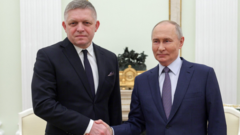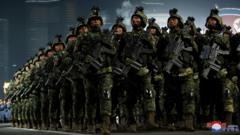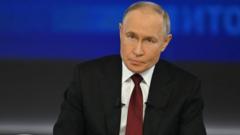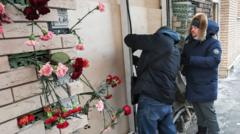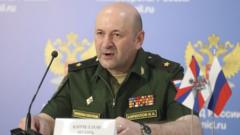The assassination of General Igor Kirillov, head of Russia's nuclear defense forces, marks a significant event in the context of the Russia-Ukraine war, with implications for military and diplomatic relations.
**Assassination of General Igor Kirillov: A Major Blow to Russian Military Leadership**

**Assassination of General Igor Kirillov: A Major Blow to Russian Military Leadership**
The recent killing of a senior Russian general raises questions about the ongoing conflict and potential retaliatory actions.
Igor Kirillov, the general responsible for Russia's nuclear and chemical weapons protection, was killed in a bomb attack in Moscow, as confirmed by Russian authorities. This striking assassination occurred on a Tuesday morning, with reports from Ukraine's security service indicating that it was a deliberate operation attributed to Ukrainian forces. The 54-year-old general died alongside an aide when an explosive device concealed within a scooter detonated near a residential building's entrance.
Details surrounding his death suggest a motive steeped in the allegations against him; just a day prior to the assassination, Ukraine had accused Kirillov of involvement in the extensive use of banned chemical weapons in the ongoing conflict. Ukrainian officials claimed that under his directives, Russian forces had resorted to chemical warfare over 4,800 times since the inception of the invasion. The explosive incident reportedly shattered windows in nearby buildings and raised tensions further.
Accusations directed at Kirillov included the deployment of various chemical agents, such as tear gas grenades, which are prohibited in warfare by the Chemical Weapons Convention—a treaty signed by Russia and other nations. Allegedly, the U.S. State Department noted that Russia had employed choking agents in the battlefield. In response to the chemical weapons allegations, the UK had imposed sanctions on Kirillov before his assassination.
In his military capacity, Kirillov was also a prominent figure in disseminating propaganda against Ukraine and Western nations, often making appearances in Russian media pushing unfounded narratives. His statements included claims that the U.S. was planning to utilize drones to release infected mosquitoes, an assertion met with skepticism.
The repercussions of this assassination are anticipated to be significant. Dmitri Medvedev, a former president and current deputy chairman of the Russian Security Council, warned of "inevitable retaliation" against Ukraine's military and political leadership. This chilling statement underscores the potential for heightened conflict following this attack on a high-ranking military figure. As the situation unfolds, the international community will be closely scrutinizing Russia's responses and the broader implications for the ongoing hostilities in Ukraine.


